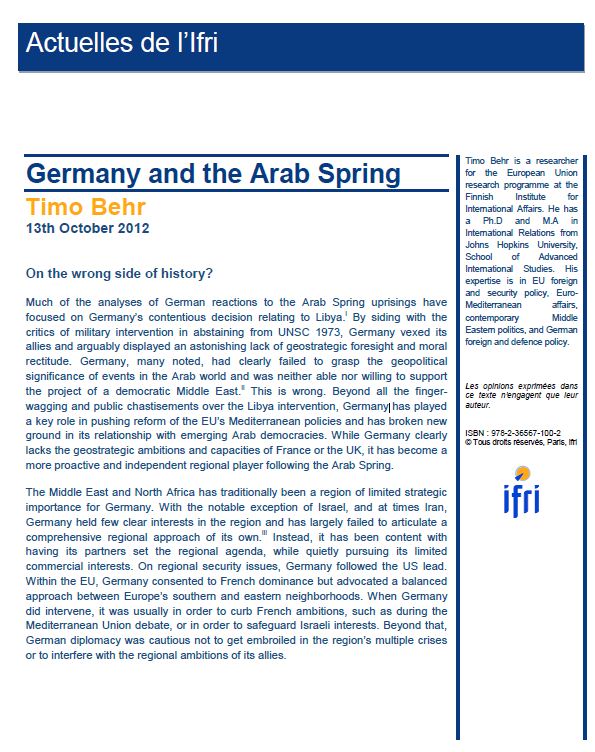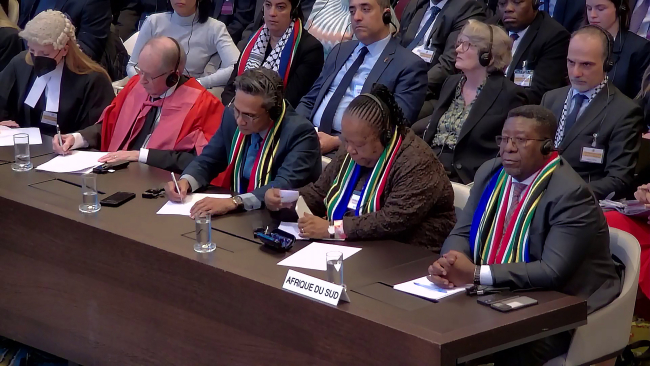Germany and the Arab Spring

Much of the analyses of German reactions to the Arab Spring uprisings have focused on Germany’s contentious decision relating to Libya. By siding with the critics of military intervention in abstaining from UNSC 1973, Germany vexed its allies and arguably displayed an astonishing lack of geostrategic foresight and moral rectitude.
Germany, many noted, had clearly failed to grasp the geopolitical significance of events in the Arab world and was neither able nor willing to support the project of a democratic Middle East. This is wrong. Beyond all the finger-wagging and public chastisements over the Libya intervention, Germany has played a key role in pushing reform of the EU’s Mediterranean policies and has broken new ground in its relationship with emerging Arab democracies. While Germany clearly lacks the geostrategic ambitions and capacities of France or the UK, it has become a more proactive and independent regional player following the Arab Spring.
The Middle East and North Africa has traditionally been a region of limited strategic importance for Germany. With the notable exception of Israel, and at times Iran, Germany held few clear interests in the region and has largely failed to articulate a comprehensive regional approach of its own. Instead, it has been content with having its partners set the regional agenda, while quietly pursuing its limited commercial interests. On regional security issues, Germany followed the US lead. Within the EU, Germany consented to French dominance but advocated a balanced approach between Europe’s southern and eastern neighborhoods. When Germany did intervene, it was usually in order to curb French ambitions, such as during the Mediterranean Union debate, or in order to safeguard Israeli interests. Beyond that, German diplomacy was cautious not to get embroiled in the region’s multiple crises or to interfere with the regional ambitions of its allies.

Available in:
Regions and themes
ISBN / ISSN
Share
Download the full analysis
This page contains only a summary of our work. If you would like to have access to all the information from our research on the subject, you can download the full version in PDF format.
Germany and the Arab Spring
Related centers and programs
Discover our other research centers and programsFind out more
Discover all our analysesCanada’s Recognition of a Palestinian State: What Consequences on its Foreign Policy Toward Palestine?
On September 21, 2025, Canada became the 148th of 157 countries to recognize Palestine as a state. It did this with the United Kingdom (UK) and Australia, defying the United States (US) and Israeli opposition.
How to Jumpstart Economic Recovery in Syria? The role of syrian entrepreneurs in Turkey
This report examines the potential role of Syrian-partnered companies operating in Türkiye in supporting economic recovery and reconstruction efforts in Syria. Based on data collected through field research and surveys conducted by the Economic Policy Research Foundation of Türkiye (TEPAV), the report provides an overview of the business characteristics, sectoral distribution, and cross-border economic activities of Syrian entrepreneurs. The report explores how this business activity could contribute to restoring supply chains, stimulating local production, and generating employment.
Indonesia and the Palestinian Cause
During his inaugural presidential speech on October 20, 2024, Indonesia’s incumbent president, Prabowo Subianto, iterated certain principles central to the philosophical foundation of the Indonesian nation. He noted Indonesia’s longstanding foreign policy of non-alignment or “bebas dan aktif” (free and active) and its aversion to military pacts.
Middle Power Lawfare : South Africa, International Justice, and the Gaza Crisis
The intensification of violence in Gaza following Hamas’s 7 October 2023 Al Aqsa Flood attack and Israel’s military response prompted a broader reassessment of global diplomacy. Longstanding geopolitical alignments were disrupted, and questions about humanitarian obligations, institutional accountability, and the limits of state conduct returned to the centre of international debate.











